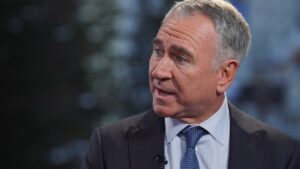A key fund set up by the U.S. government in the late 1990s to help pay for the expansion of fast internet in America is in jeopardy, but not only because of cord-cutting, according to a new report.
The pot of revenue available to the government’s Universal Services Fund to expand America’s broadband has shrunk by about 63% since 2001, to roughly $29.6 billion, according to a new report from Mattey Consulting.
What’s more, that figure is expected to drop to $22.9 billion in five years, and keep declining by another 5% annually, unless something changes in the way the booming telecommunications industry classifies its revenue in the digital age.
This chart shows what happened in the past decade, with revenue more than doubling in the telecom industry to $361.2 billion, but with the amount categorized as a telecom “contribution” to the Federal Communications Commission’s Universal Services Fund continuing to decline.
A key fund to expand internet access is declining as telecom revenue climbs.
Mattey Consulting
In other words, the funding mechanism to support the fund “is under significant duress,” wrote Carol Mattey, the report’s author.
Mattey, a former FCC Wireline Competition Bureau deputy chief focused on the USF, attributed the decline in part to 20-year-old FCC rules that give companies significant leeway to categorize revenue in ways that reduce USF commitments.
Mobile operators, specifically, have been “classifying most of their monthly service revenues as data, not voice,” Mattey wrote.
“While some may assume the decline in the USF contribution base is due to a decline in long-distance revenues or many consumers cutting their landline voice service, in fact the most dramatic decline in reported retail revenues over this period has been for mobile services.”
Here’s the report’s breakdown in retail revenue declines since 2010.

Changing how revenue is classified.
Mattey Consulting
Changes to the USF’s fortunes come two decades since the passage of the Telecommunications Act of 1996, a law enacted under President Bill Clinton that not only opened up the airwaves to more competition — and revenue sources to private companies— but solidified the FCC’s USF as a way to pay for universal access to the internet.
The pandemic put a spotlight on America’s digital divide and the need to beef up internet access, not only in rural areas, but also to connect schools, hospitals and libraries to low-income households.
See: Opportunity in America starts with fixing the internet, says social investing pioneer
The Biden administration’s plan to spent $1 trillion on infrastructure nationwide includes a vow to get fast and affordable internet to everyone in the U.S.
PAVE,
But without reforms to “stop to death spiral” of the USF’s current “contribution methodology,” Mattey thinks congressional funding to expand broadband will eventually fall short.
“Even if Congress appropriates additional funding to support the nation’s goal to achieve universal broadband,” the USF needs to be on a stable financial footing so it can support “critical institutions such as schools, libraries, and rural health care facilities” well into the future.
Read: Should there be a ‘Netflix tax’ to pay back cities for cable infrastructure?
U.S. stocks
SPX,
finished lower Tuesday, with the Dow Jones Industrial Average
DJIA,
shedding almost 300 points, as investors grapple with lofty valuations and a backdrop where the power of fiscal and monetary stimulus unleashed during the pandemic may be waning.
This post was originally published on Market Watch






